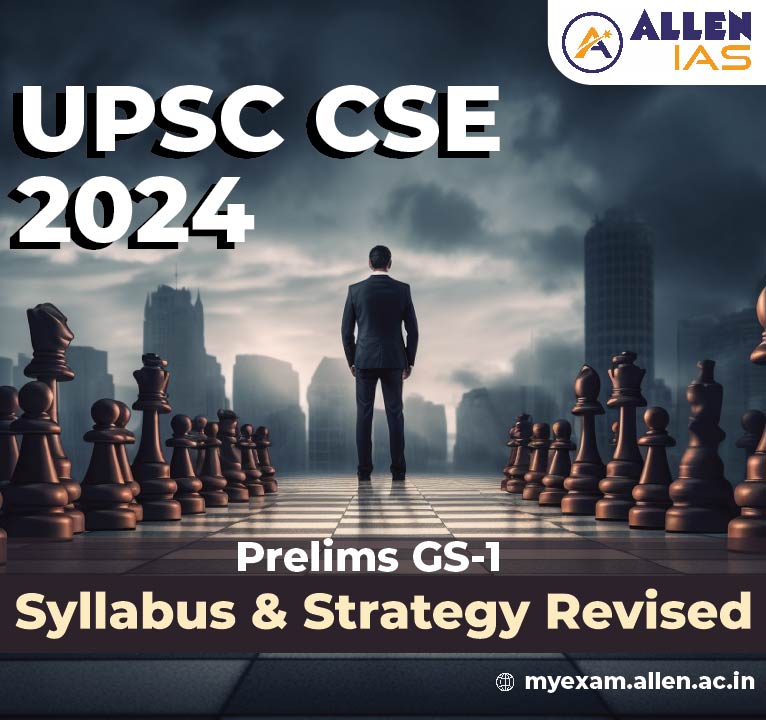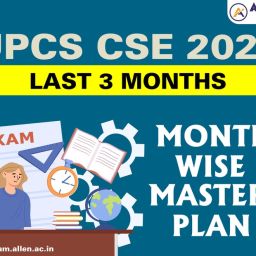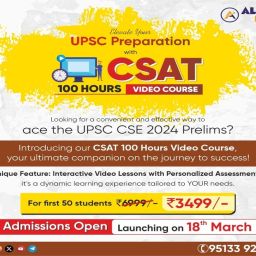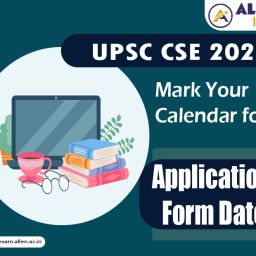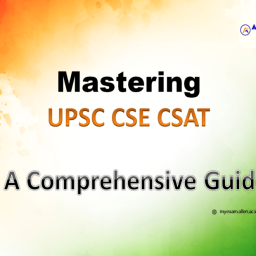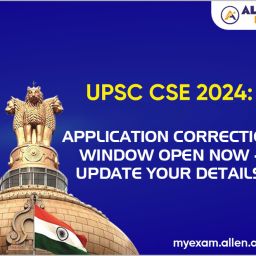Syllabus & Strategy Revised For UPSC CSE 2024 Prelims
The Union Public Service Commission conducts the Civil Services Exam every year, and the preliminary round is known as UPSC Prelims. Although the Civil Services (Preliminary) test is the official name of this phase, candidates most commonly call it UPSC Prelims or IAS Prelims.
Syllabus: As mentioned in UPSC CSE notification
- Current events of national and international importance.
- History of India and Indian National Movement.
- Indian and World Geography – Physical, Social, Economic Geography of India and the World.
- Indian Polity and Governance – Constitution, Political System, Panchayati Raj, Public Policy, Rights Issues, etc.
- Economic and Social Development – Sustainable Development, Poverty, Inclusion, Demographics, Social Sector initiatives, etc.
- General issues on Environmental Ecology, Bio-diversity, and Climate Change – that do not require subject specialization
- General Science
Paper pattern: Maximum marks: 200; Duration: 2 Hours; Number of questions: 100
Marking scheme: In this paper, there would be 100 questions, each with 2 marks. You will lose 1/3rd of the marks given for that question for each erroneous response.
Syllabus and Resources:
| Topics | Resources |
| ● Current events of national and international importance.
|
● Important editorials of – The Hindu, Indian express, The mint, and Business standard, etc.
● Government websites – Different Ministries website / NITI Aayog website/ PIB/PRS legislative research/Year-end reviews of various ministries/India year book (IYB)/Economic survey (Important chapters)/Union budget. ● Different magazines like Down to Earth/Yojana/Kurukshetra/EPW/ Frontline/Science reporter etc. ● ALLEN ACE current affairs booklets
|
| ● History of India and Indian National Movement. | ● Indian Art and Culture
○ An Introduction to Indian Art – Class XI NCERT ○ Indian Art and Culture by Nitin Singhania ○ Centre for Cultural Resource and Training (CCRT) material ○ Heritage Crafts: Living Craft Traditions of India -NCERT ● Ancient History of India ○ Old NCERT by RS Sharma ● Medieval History of India ○ Old NCERT by Satish Chandra (Selective Reading) ● Modern History ○ A Brief History of Modern India- Spectrum Publications ○ India’s Struggle for Independence – Bipan Chandra (Selective Reading) ○ NCERT by Bipan Chandra (For the period 1700s to 1857)along with some selective reading of new NCERT ● ALLEN ACE booklets |
| ● Indian and World Geography-Physical, Social, and Economic Geography of India and the World.
|
● Fundamentals of Physical Geography NCERT XI
● India: Physical Environment NCERT XI ● Fundamentals of Human Geography NCERT XII ● India: People and Economy NCERT XII ● Certificate Physical and Human Geography: GC Leong ● World Atlas (Orient Black Swan) ● ALLEN ACE booklets
|
| ● Indian Polity and Governance – Constitution, Political System, Panchayati Raj, Public Policy, Rights Issues, etc. | ● NCERT Class IX-XII
● Indian Polity by M Laxmikanth ● Introduction to the Constitution of India by DD Basu ● Important editorials from The Hindu,Indian express etc. ● ALLEN ACE booklets |
| ● Economic and Social Development – Sustainable Development, Poverty, Inclusion, Demographics, Social Sector initiatives, etc. | ● Macroeconomics – NCERT Class XII
● Indian Economic Development – NCERT Class XI ● Indian Economy – Nitin Singhania ● Indian Economy -Ramesh Singh ● Economic Survey and Union budget (Selective reading from Prelims perspective) ● The Hindu, Economic times, Indian express,Livemint etc. ● Internet for better understanding of the concepts (Arthapedia, RBI,Ministry of finance website etc.) ● ALLEN ACE booklets |
| ● General issues on Environmental Ecology, Biodiversity, and Climate Change – that do not require subject specialization
|
● NCERT class XIIth biology (Chapter 13 to 16)
● The Hindu, Indian express (Read about latest environmental terms, important summits, changes pertaining to various environmental legislations, national parks, and wildlife sanctuaries) ● Good magazines like Down to earth, etc. ● ALLEN ACE booklets |
| ● General Science
|
● NCERT class VIth to XIIth
● The Hindu, Indian express (Read about the latest scientific terms, discoveries, and inventions which are frequently in news) ● Latest development through website of ISRO, DRDO,Ministry of Science and technology etc. ● ALLEN ACE booklets |
Trends of Previous year questions (PYQs) :
| Year/Subject | Current Affairs | History | Geography | Polity | Economics | Science and Technology | Environment |
| 2012 | 1 | 19 | 17 | 20 | 17 | 9 | 17 |
| 2013 | 0 | 16 | 18 | 16 | 19 | 14 | 17 |
| 2014 | 08 | 22 | 14 | 14 | 10 | 16 | 18 |
| 2015 | 26 | 17 | 16 | 13 | 13 | 08 | 11 |
| 2016 | 27 | 15 | 07 | 07 | 18 | 08 | 18 |
| 2017 | 15 | 14 | 09 | 22 | 16 | 09 | 15 |
| 2018 | 14 | 22 | 10 | 13 | 18 | 10 | 13 |
| 2019 | 22 | 17 | 14 | 15 | 14 | 07 | 11 |
| 2020 | 18 | 20 | 10 | 17 | 15 | 10 | 10 |
| 2021 | 14 | 20 | 10 | 14 | 15 | 12 | 15 |
| 2022 | 11 | 16 | 12 | 13 | 17 | 14 | 17 |
Strategy for GS prelims Paper 1:
| Topics | Strategy to be kept in mind while studying |
| ● Current events of national and international importance.
|
● Keep in mind while studying current affairs that it’s paper of general studies, not a paper that demands specialization.
● Hence, Candidates must be extremely aware and curious in order to continue learning and developing their capacity to assimilate enormous amounts of information. ● Just memorizing the facts/news will not suffice, the candidate should put more concentration on analyzing the news. For example, UPSC would not be just interested in asking questions that who launched the James Webb telescope but how it is different from the earlier missions. ● Try to connect news from your static syllabus and make multiple linkages with various topics. ● As far as newspapers and magazines are concerned use a limited number of them that have a well-proven track record. For example, The Hindu, which offers a great analysis of every subject that a potential civil service applicant must be aware of, is one newspaper that many successful candidates have so far opted to read. ● For the verification of the current affairs/ facts/news try to refer to authentic government websites/PIB etc. |
| ● History of India and Indian National Movement. | ● To establish a strong theoretical basis in History, start with the NCERTs.
● Examine the papers from the previous year to learn about the main subjects, the level of difficulty of the questions, etc. ● The best place to start for arts and culture is with Nitin Singhania’s book and the NCERT class 11th. ● It would be better to concentrate on factual information/medieval Indian history/art and culture because recent years have seen an increase in this section of the history subject. ● Not to mention, avoid speculating in the history area. It’s advantageous if you can remove options. Otherwise, it might be best to ignore the question. ● Last but not least, In the present scenario of the paper candidate should also be aware of current affairs events. |
| ● Indian and World Geography-Physical, Social, and Economic Geography of India and the World.
|
● World Geography and Indian Geography are the two sections of the UPSC Prelims Geography Syllabus.
● After going through NCERT booklets, analyze the previous years’ question papers, By answering the questions, you may have a better understanding of the question papers and gauge your progress at each stage. ● Priortisation of topics in geography will help you to target better scores in this section. For example, A solid grasp of physical geography shortens the learning curve for topics in Indian geography and enables you to compare and contrast Indian and global geographies. ● In the present scenario importance of maps cannot be ignored. Hence, detailed knowledge of maps’ locations, significant cities, physical characteristics, river systems, passes, and peaks could and should be learned from maps of India and the rest of the world. ● Most of the static topics covered in this course have dynamic connections to current events and national and international issues. In such situations, reading current affairs is essential. |
| ● Indian Polity and Governance – Constitution, Political System, Panchayati Raj, Public Policy, Rights Issues, etc. | ● The simplicity of NCERT textbooks makes them an interesting read and gives a good insight for beginners. After that one refer to India Polity by M. Laxmikanth, which alone can aid a candidate to score higher marks in this section.
● Since the syllabus is factual and brief, polity is one of the subjects that is easiest to score well in. ● In the UPSC prelims’ Polity section, one can anticipate a lot of straightforward questions and, with careful preparation, obtain the majority of the answers correctly. ● There will probably be a lot of questions in this section. The majority of the questions have been determined to be direct throughout time, and their level of difficulty ranges from easy to moderate. ● It is essential for a candidate to stay current with local events because doing so fosters awareness of one’s rights, obligations, and responsibilities and enables one to make an informed decision. ● In the current trends questions from the political theories are also asked,for that one can go for the selective reading of class XIth NCERT Political theory book. ● It is not necessary for candidates to memorize every article of the Indian Constitution. There are only a few key articles that are required. If one is familiar with the fundamentals and has reviewed the topic a sufficient number of times, the majority of pertinent articles will automatically get registered. ● The simplicity of NCERT textbooks makes them an interesting read and gives a good insight for beginners. After that one refer to India Polity by M. Laxmikanth, which alone can aid a candidate to score higher marks in this section. ● Most of the static topics covered in this course have dynamic connections to current events and national and international issues. In such situations, reading current affairs is essential. |
| ● Economic and Social Development – Sustainable Development, Poverty, Inclusion, Demographics, Social Sector initiatives, etc. | ● First thing first, one should go thorough NCERT first then can refer to standard books like Nitin Singhnia etc. for a better understanding of the concepts.
● Questions are not factual and are mostly based on basic concepts. ● With UPSC, no single source could be sufficient; instead, one must consider whether they could research a topic more within their time limits. ● Analyse the Last 10-year Prelims question papers – most of the economy questions are conceptual in nature. Hence one should focus with more of an analytical mindset rather than mugging up the concept. ● Reports of various World organizations are asked – so one needs to prepare them separately. ● Special focus should be given to the government schemes section as it can act as an easy section for marks fetching. ● Most of the static topics covered in this course have dynamic connections to current events and national and international issues. In such situations, reading current affairs is essential. Along with it Union budget/economic survey should be given at most priority. |
| ● General issues on Environmental Ecology, Biodiversity, and Climate Change – that do not require subject specialization
|
● Go through the NCERT class 12th biology (selective chapters) and try to learn it so as to map the topics in your mind. By doing so, you will be able to filter out irrelevant study material and keep your preparation focused.
● This section can be your make-or-break section in the GS prelims exam. As every year 15-20 questions are featured in the examination. Hence due diligence should be given to this section. ● Repetitive aspects of the questions like International initiatives, national initiatives, environmental theory, national parks, wildlife sanctuaries reserves, species, chemicals, and pollutants cannot be ignored. ● The news frequently refers to concepts like climate change, ecosystem, sustainable development, natural disaster, etc. Should be given special focus. ● Interlinking the Environment topics with core concepts of other subjects like geography, biology, botany, zoology, and also the economy should be kept in mind while studying. ● Since many government programs are geared at protecting natural resources and the environment, maintaining flora and fauna, minimizing pollution, etc., the environment can also intersect with policy and governance. ● Most of the static topics covered in this course have dynamic connections to current events and national and international issues. In such situations, reading current affairs is essential. |
| ● General Science | ● Firstly, go through all the basics by covering all the relevant NCERT books and revise them thoroughly.
● You don’t need a doctorate in science; the goal is to cover as much ground as you can. ● Remain updated on the newest scientific advancements occurring in India and around the world. ● Learn about the year’s Nobel Prize winners and the fields they worked in. ● Consider the fundamental science at play whenever there is a scientific event in India. ● Look it up online if any NCERT idea perplexes you or you don’t comprehend it well enough. ● Follow ISRO, DRDO, and Ministry of Science & Technology websites and news. ● Refer to newspapers like The Hindu and its special science edition on Thursdays. ● Refer to magazines like Science Reporter. |
Click Here to Know More About ALLEN IAS Couses
Recommend Article on UPSC CSE 2024:-
- UPSC CSE 2024: Mark Your Calendar for Application Form Date
- Cracking UPSC CSE : Unveiling The Best Optional Subject Strategy for Aspirants
- UPSC CSE 2024 Unleashed: Dominate with a Dynamic Current Affairs Mastery Plan!
- Unlocking Success: Your Daily Ritual for UPSC CSE Victory – The Power of Regular Answer Writing
- Mastering UPSC CSE CSAT: A Comprehensive Guide
- Navigating the Final Lap: UPSC CSE Preparation Tips for the Last 4 Months


